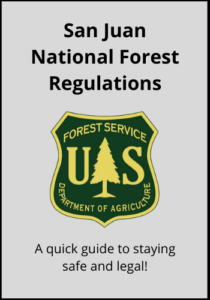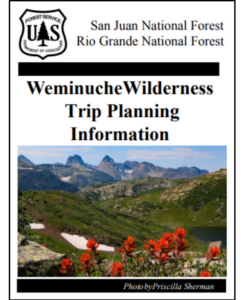Regulations & Recommended Practices
San Juan National Forest Regulations
Visit the San Juan National Forest for a complete list of San Juan National Forest regulations.
- Do not leave campfires unattended. Make sure your fire is out and ashes are cold.
- Pack out and properly dispose of all trash. Do not bury trash. Note that used toilet paper is considered trash and needs to be packed out.
- Cutting or damaging live trees is prohibited.
- Caching of equipment for more than 14 days is not permitted.
- Permits ARE required if you are outfitting or leading a group of any size for monetary or other compensation, even if you are doing so for a nonprofit organization. Contact the USDA Forest Service to confirm that your outfitter has a permit.
- Hunting is regulated by Colorado Parks and Wildlife.
- All stock feed must be weed–free certified in Colorado, Idaho, Montana, Nebraska, Wyoming, or Utah and be marked with certified twine, packing, or transit certificate. Only the following are allowed.
- Weed–free baled hay
- Cubed or pelletized hay
- Steamed grain in a processor’s stamped bag
- Weed–free baled mulch made from tree fibers or steamed material.
- Drone use: Follow the guidelines in this document. The Ice Lakes area is a place people go to appreciate the quiet beauty of the area, so drones are not recommended.
- Fire Restrictions: Fire restrictions can go into effect without advance notification, so check on fire restriction status just before you depart as well as on the information board at the trailhead. Visit the San Juan National Forest (SJNF) website for fire restrictions and closures, or you can contact the SJNF at 970-247-4874. When fire danger is extremely high, Stage 1 and Stage 2 Fire Restrictions may be followed by a complete Forest closure, which is sometime referred to as Stage 3.
- Stage 1 Restrictions: No campfires and no wood fired camp stoves and no smoking.
- Stage 2 Restrictions: In addition to all the Stage 1 restrictions, no white gas, kerosene, esbit or alcohol stoves. Only canister (isobutene or propane) backpacking stoves or lanterns that include shutoff valves are allowed and they need to be used at least 3 feet away from flammable material such as grass.
- Fireworks: Fireworks are NEVER allowed in National Forests
Wilderness Regulations
 The wilderness regulations are designed to help ensure the protection of the wilderness environment, including Chicago Basin. The following regulations are strictly enforced by Wilderness Rangers who frequently visit the area.
The wilderness regulations are designed to help ensure the protection of the wilderness environment, including Chicago Basin. The following regulations are strictly enforced by Wilderness Rangers who frequently visit the area.
- Maximum group size is limited to 15 per group, with maximum combination of people and stock not to exceed 25.
- Camping is not permitted within 100 feet (approximately 35 adult steps) of streams or lakes, except as designated or posted.
- Disposal of human waste and wash water is prohibited within 100 feet (35 adult steps) of any water source.
- Pack out and properly dispose of all trash. Do not bury it.
- Shortcutting of switchbacks is prohibited.
- Pets must be under voice control or physical restraint.
- Recreational livestock are prohibited from being restrained within 100′ (35 adult steps) of water.
- All livestock feed must be certified weed free.
- Possession of motorized equipment and mechanized means of transport are not permitted.
Chicago Basin Specific Regulations
- Camping is not allowed in Twin Lakes Basin (north of Chicago Basin). This includes the entire area bounded by the three 14ers.
- Campfires are not allowed in the Needle Creek drainage and its tributaries. This includes Chicago Basin, Twin Lakes Basin, and the alpine basins below Columbine Pass.
- Please note: Private land does exist in Chicago Basin area and private landowners may be having a fire on their land. Federal regulations do not apply to private property.
